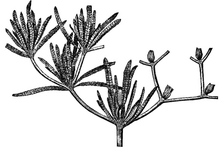Williamsoniaceae
Appearance
| Williamsoniaceae Temporal range:
| |
|---|---|

| |
| Restoration of Wielandiella | |

| |
| Diagram of Weltrichia, a male reproductive structure | |
| Scientific classification | |
| Kingdom: | Plantae |
| Clade: | Tracheophytes |
| Order: | †Bennettitales |
| Family: | †Williamsoniaceae (Carruthers) Nathorst, 1913 |
| Genera | |
| |
Williamsoniaceae is a family within the Bennettitales, an extinct group of seed plants within the Cycadophyta subdivision. Members of this family are believed to have been around two meters tall and with widely serrate leaves along a central stem. Reproductive organs of the Williamsoniaceae have varied widely in the fossil record but almost all have been found to be borne on stalks emerging from a ring of leaves.[1]

Reproduction
[edit]This family is different from Cycadeoidaceae by having the presence of cones leaving the major axis and lateral branches associated with a long peduncle covered by bracts. Some of this family reproduce by sporangia and others only produce ovule or pollen sacs.[2]
References
[edit]- ^ Meyen, Sergei V. (1984). "Basic Features of Gymnosperm Systematics and Phylogeny as Evidenced by the Fossil Record". Botanical Review. 50 (1): 1–111. doi:10.1007/BF02874305. JSTOR 4354028. S2CID 38485693.
- ^ Paleontologia Paleovertebrados e Paleobotânica Autor : Ismar de Souza Carvalho. Editora Interciência. Archived 2016-03-04 at the Wayback Machine
